With an increased demand for screen-free, analogue hobbies over digital consumption, film photography feels more relevant than ever in 2026. Read on to discover how shooting film offers a slower, more mindful, more intentional way to create images - and staying present in moments that truly matter.
Recent posts
Shop the article
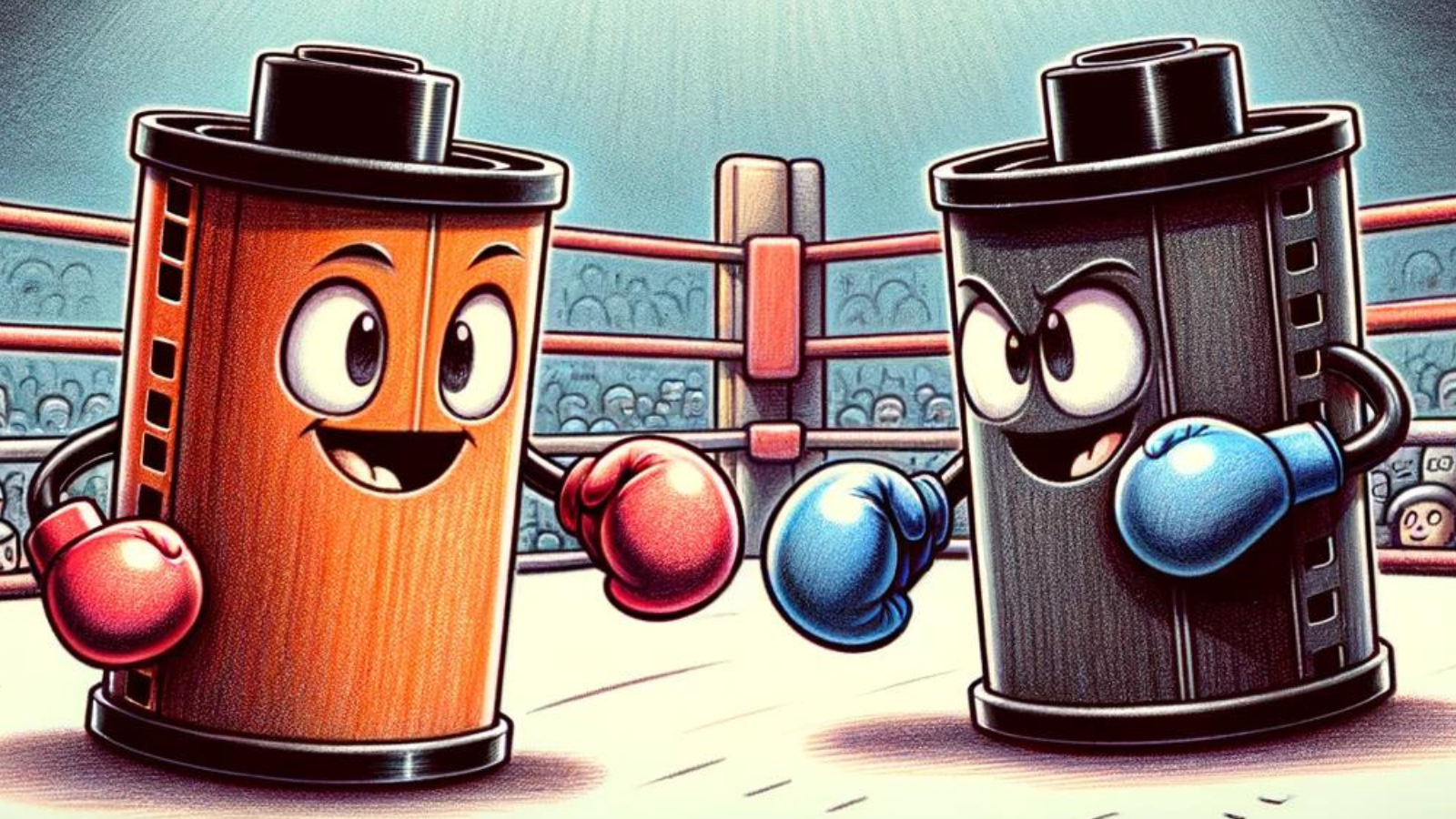
Discover the Best 35mm Films: Community Picks for Every Photographer
By Paul McKay
In a world increasingly dominated by digital imagery, the charm of 35mm film photography holds a special allure. And the specific film you choose plays a really important role in your artistic journey. But rather than us at Analogue Wonderland dictating 'these are the best 35mm films that you should shoot' we thought it would be more helpful to share what the community thinks! So in no particular order, here are the top 35mm films that have the most reviews and highest average score on our site ❤️ Enjoy!
Quick Reminder: What is 35mm Film?
Tracing its lineage back to the early 20th century, 35mm film has been the cornerstone of photography for over a century. The first 35mm still camera, developed by Leica in 1913, revolutionised the way we capture the world.
Historical Fact: The iconic Leica camera, which popularised 35mm film, was originally designed to test movie film during the early days of cinema.
Today, 35mm film is cherished not only for its nostalgic charm but for the distinctive texture, depth, and warmth it brings to every shot. Its versatility and ease of use continue to attract analogue photographers, making it the most popular film formats in use today.
The Community's Top 35mm Films
1. Ilford HP5 Plus
A black and white film that exudes versatility and classic charm, Ilford HP5 Plus is a legend in the world of film photography. Known for its wide exposure latitude and robust nature, HP5 is one of the best 35mm films for capturing life's moments with depth and nuance.
The Analogue Wonderland community holds Ilford HP5 Plus 35mm film in high regard, celebrating its versatility, reliability, and exceptional quality for black and white photography. One reviewer, EMULSIVE, appreciates its ability to "pick out fine detail in both the brightest and darkest parts of the image," describing it as a "genuinely wonderful film stock". Another enthusiast, Jack, names it as their go-to black and white film, praising its reliability and beautiful results in varied lighting conditions.

"I've used HP5 for a number of years and it never fails to impress. Versatile and great tonal range, perfect for a range of shooting conditions." - @honourmish
The film's affordability coupled with its high quality makes it a favourite among photographers. Thomas Wesley highlights it as the "best film for the money," emphasising its position as his favourite black and white film due to its versatility. Furthermore, users like AR note the film's fine grain and excellent performance in different light settings, describing it as "nice and not too expensive." It even looks great in half-frame!
Community feedback also touches on the film's smoothness and high contrast, with reviewers like Peter describing HP5 as "beautifully smooth and silky," a testament to its aesthetic appeal in the realm of film photography. The consensus among Analogue Wonderland's customers is clear: Ilford HP5 Plus 35mm film stands out for its ability to deliver high-quality, visually striking images across a broad spectrum of photographic settings. It's also one of the most common films used by professionals who shoot weddings on film.
It is consistently the best-selling monochrome emulsion in the UK, with more than 500 5* reviews on our site at the time of writing.
Learn more about Ilford HP5 Plus.
2. Kodak Portra 400
Kodak Portra 400 is a colour negative film revered for its fine grain and exceptional colour accuracy. As such it is a favourite among portrait and street photographers. Its flexibility in varied lighting conditions makes it incredibly versatile.
garners high praise from the Analogue Wonderland community for its outstanding versatility, exceptional colour reproduction, and reliability in a wide range of lighting conditions. Peter describes it as an "excellent go-to film with beautiful flattering colours," highlighting its distinct ability to produce images with unique charm and warmth. This sentiment is echoed by many who appreciate its balanced colour palette, making it a favourite for capturing life's moments with a touch of elegance.
Matthew M regards Portra 400 as the "middle man of colour film," pointing out its versatility and how it excellently balances between various shooting conditions, thereby positioning it as a solid choice for photographers seeking flexibility without compromising on quality. Alex, in particular, notes its performance while travelling, mentioning how it "tends to the greens at night," yet still delivers lovely colour reproduction, further underlining its adaptability and the unique character it brings to images.
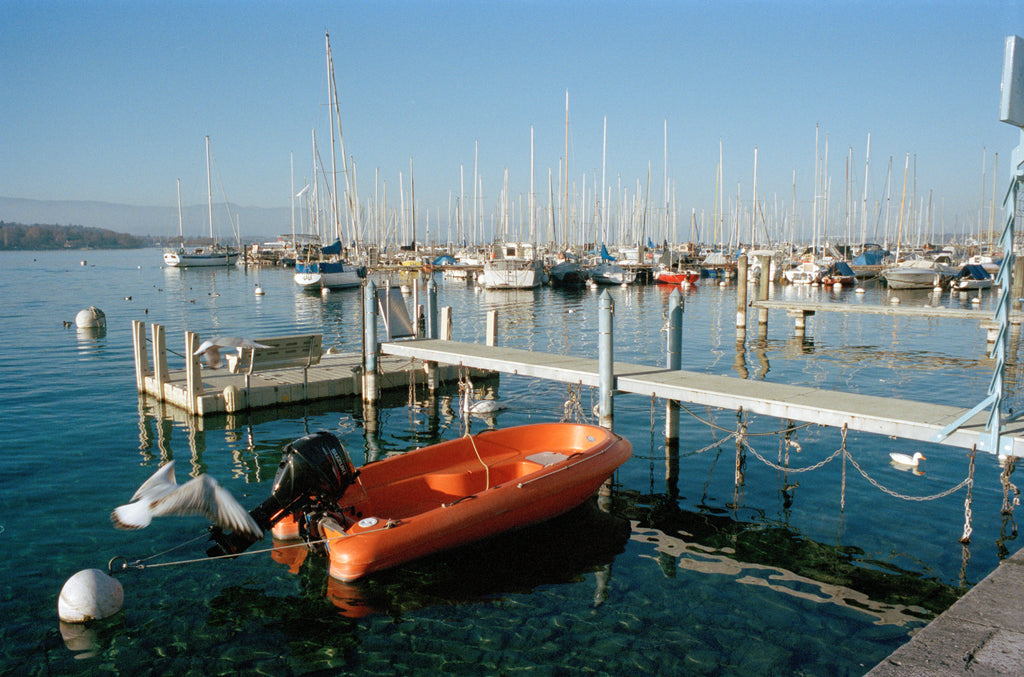
Great colours? Accurate shadows? Detail in the highlights? Must be Kodak Portra 400! Shot by Paul McKay
Siddharth Govindan and Mike express their trust and preference for Portra 400, with Siddharth stating it's a film "you can trust blindly" because of its consistency and reliability. Mike refers to it as his "go-to everyday colour film," a testament to its all-around performance and the high esteem in which it's held within the community.
Kodak Portra 400 stands out for not only capturing stunning visuals but also for enabling photographers to convey the depth and nuance of their creative visions. Although it's part of Kodak's more expensive 'Pro' range, the step up in quality is obvious to all - as evidenced by an average customer score of 4.92/5 from hundreds of individual shooters.
Learn more about Kodak Portra 400.
3. Kodak Gold 200
The Kodak Gold 35mm film has received numerous commendations from the analogue photography community for its exceptional quality and value. Customers are particularly impressed by its "beautiful warm tones at an affordable price," as highlighted by Alex C. Emily adds, "Kodak Gold's warm tones are perfect for capturing the essence of summer days." The film's "great exposure latitude" and affordability make it a favoured choice among film shooters across the world.
Ash, another customer, was pleasantly surprised by the film's performance, noting, "I wasn't expecting much from this film, but having developed the photos, I was amazed at the warm tones it produces." This sentiment is echoed by Sasha G, who appreciated the film's budget-friendliness without compromising on the quality of the images, stating, "I didn't have super high hopes given the price, but I was very pleasantly surprised."

The look of Gold is very '80s and 90s snapshot' which is a wonderful aesthetic in its own right. It doesn't have the richness or detail of Portra, but it is more affordable so that makes sense! Photo (c) Paul McKay
The film's accessibility and ease of use have also been praised, making it an excellent option for those new to film photography. Abdul finds it "Great for beginners," appreciating the quick delivery and expressing a likelihood to recommend it. The film's value for money is another frequently mentioned advantage, with customer L mentioning, "It worked well for me :) and price is a bonus," underscoring the film's appeal to a wide range of photographers looking for quality at a reasonable cost.
Overall, the community's feedback on Kodak Gold 35mm film is overwhelmingly positive, with its warm tones, affordability, and suitability for various levels of photography experience being the most highlighted features. Its reputation as an "amazing budget colour film," as Sasha G puts it, combined with the 585 independent 5* customer reviews it's received on our site, demonstrates the film's ability to deliver beautiful, high-quality images without breaking the bank. A beloved choice within the analogue photography world.
Learn more about Kodak Gold 200.
4. Kentmere 100
Kentmere 100 35mm film garners positive reviews (and an average of 4.86/5!) for its affordability and performance, striking a chord with both novice and experienced photographers. Peter highlights its value, stating, "Cheaper films are usually cheap for a reason, but Kentmere bucks this trend." This sentiment underscores the film's ability to deliver quality results without the hefty price tag often associated with more renowned black and white brands. The film is praised for its versatility and ability to produce pleasing results in various lighting conditions, a point Ian Stenson supports by noting, "Shot in bright sunlight, very pleased with the results."
First-time users and those revisiting black & white film photography find Kentmere 100 particularly appealing. Chris Hills shares his experience of using the film with an old Kodak Retinette, expressing satisfaction with the "lovely fine grain and sharp contrast" that the film provided. This feedback reflects Kentmere 100's capability to breathe new life into vintage cameras, offering an accessible entry point for individuals exploring the nuanced world of black & white photography. Harriet's comment, "This is the first roll of black & white film I've ever shot, and I'm really pleased with the results," further illustrates the film's role in demystifying black & white photography for beginners.
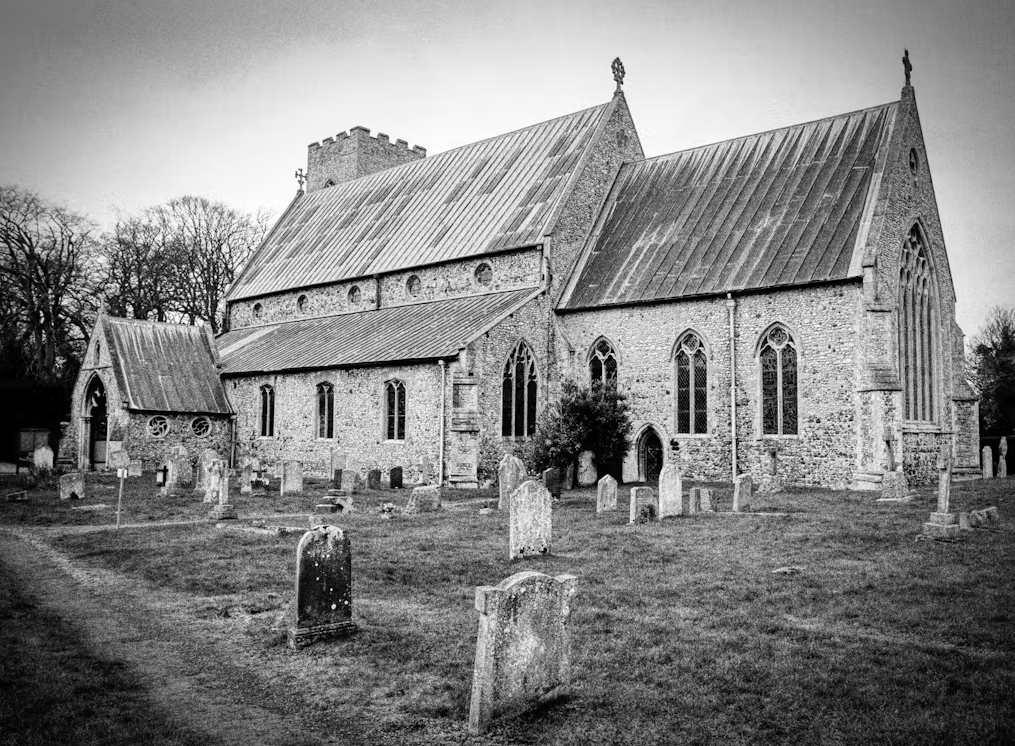
"Let there be Kentmere 100" - @chrismojo on X
Kentmere 100's classification as a budget film does not hinder its ability to surprise and delight users with its quality. Nigel finds the film "Surprisingly good!", a testament to its ability to exceed expectations. The consensus among reviewers is that Kentmere 100 offers great value for money, marrying affordability with commendable image quality.
Its fine grain, sharp contrast, and adaptability across different lighting scenarios make it a favoured choice for photographers looking to explore the rich textures and timeless aesthetic of black & white imagery without significant financial investment. In today's world that must come as pleasant news!
Learn more about Kentmere 100.
5. Cinestill 800T
Cinestill 800T 35mm film receives rave reviews from the photography community - with 236 5* reviews on our site alone - especially for its unique aesthetic and performance under low-light conditions. Tommy's enthusiasm is palpable, "After trying Cinestill 800T for the first time, I was blown away!" This sentiment is echoed across the board, with many photographers appreciating the film's ability to capture vibrant and moody scenes, particularly at night.
Gordon Palmer finds it "Great as an outdoors film pretty much most times of day," highlighting its versatility. The film's high ISO rating makes it a favourite for evening shoots, where its tungsten balance brings out stunning colours and contrast in artificial lighting conditions.
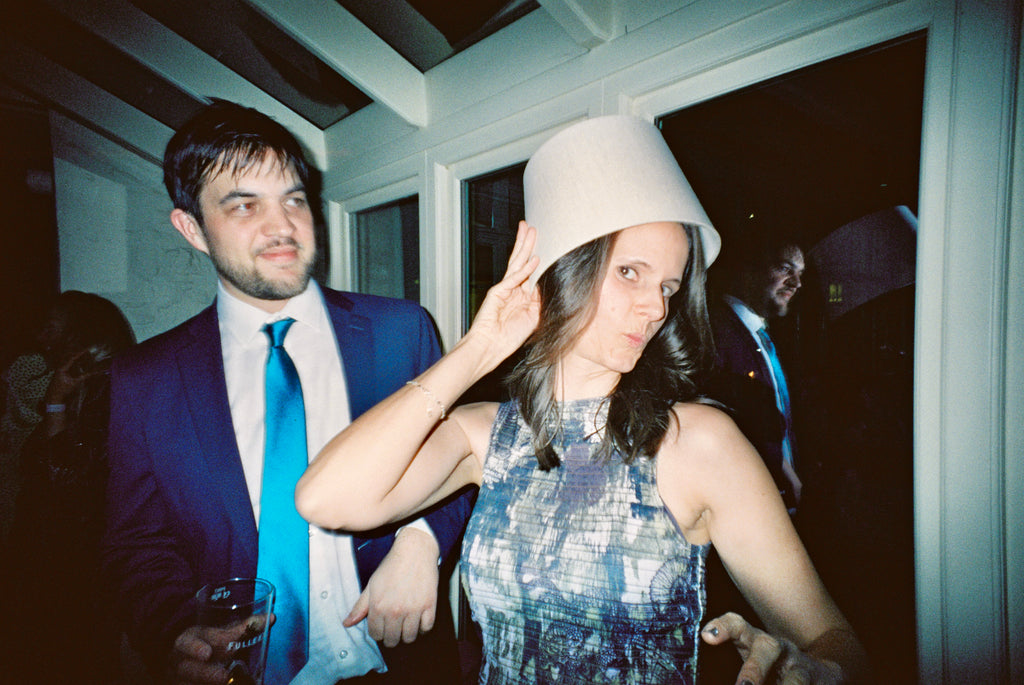
Shot at a friend's wedding in December - I knew there wouldn't be much light but a simple flash and the natural sensitivity of the film brought the dancefloor to life! (c) Paul McKay
The distinctive look of Cinestill 800T, characterised by its halation effect, where bright light sources bloom with a soft, ethereal glow, is particularly celebrated. Siddharth Govindan remarks, "I live for that kind of halation!" The removal of the anti-halation backing, a modification from its original cinematic stock, Kodak Vision3, gives Cinestill 800T its signature look, making it a creative choice for photographers looking to add a cinematic flair to their work. This unique feature sets Cinestill apart from traditional colour films and has become a defining characteristic appreciated by those seeking to experiment with mood and atmosphere in their photography.
Chris Watson's review, "WOW, I was so impressed with this film when I first used it for night photography," speaks volumes about the film's capability to excel in challenging lighting conditions. Sergey V. Popov's comparison, "With the demise of Natura, this is the fastest film you can get that's still somewhat affordable," places Cinestill 800T as a valuable asset in a photographer's arsenal, particularly in the absence of other high-speed colour options.
The community's consensus is that Cinestill 800T 35mm film not only meets the practical needs of shooting in low light but also offers an artistic tool for capturing images with a distinctive, cinematic quality that can transform ordinary scenes into something extraordinary.
Learn more about Cinestill 800T 35mm film.
Choosing the Best 35mm Film for Your Camera
The art of selecting the perfect 35mm film combines personal preference with the technical aspects of photography. If you're heading into a specific situation like a concert or gig then that will bring it's own limitations. Consider factors like film grain, contrast, and colour rendition in relation to your subject and lighting conditions - as well as the simple 'what brings you joy'?
Each film carries its own signature, capable of transforming an ordinary scene into a compelling visual narrative. As you explore these popular films, consider how each can serve your creative vision, from the dramatic tones of the top black and white films to the vibrant hues of colour films.
If you're about to shoot your first roll of film then this all becomes much simpler: what fits your camera and how much light is there going to be?!
Where to Buy and Develop Your 35mm Film
At Analogue Wonderland, we understand the passion behind every roll of film. You can look through our extensive range of 35mm films - filtering by brand, ISO, and type - and if you're still struggling to decide then check out our Wall of Inspiration for more than 15,000 customer reviews and sample images!
Once you've captured your moments, bring them to life with our professional 35mm film developing service.
The Artistic Impact of Film Choice on Photography
Hopefully you've already seen from the above that your choice of film can significantly influence the mood and narrative of your photographs.
Photography has profoundly influenced how we document, understand, and interpret the world since its invention in 1839. Serving as a critical tool in the evolution of visual representation, photography allows for the capture of fleeting moments that for most of history was simply impossible. The advent of 35mm film dramatically increased its global uptake thanks to the portability and convenience of the 35mm cameras - and exploded the world of 'hobby photographers'.
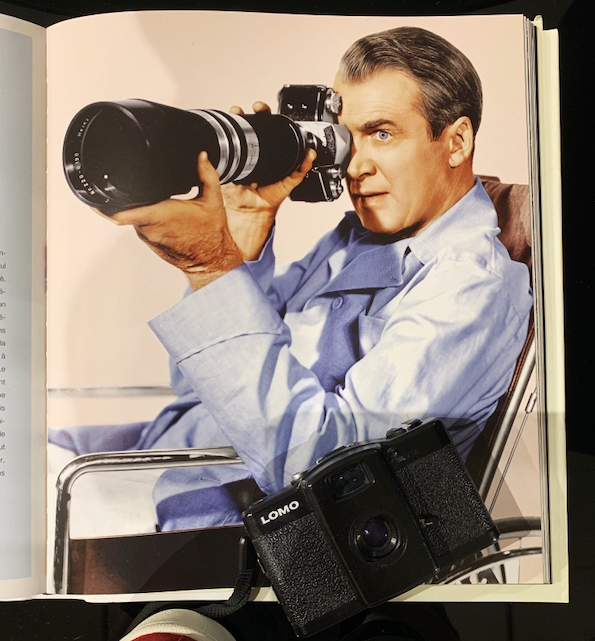
James Stewart showing off his set-up in 'Rear Window' - in comparison with my much-more-portable Lomography LC-A camera!
Photography's inherent reproducibility has also enabled widespread dissemination, affecting not only the art world but also how societies remember, communicate, and engage with their histories and cultures. For many people their smartphone will be their main camera, but I've personally found that I take more meaningful photos when I have a roll of 35mm film and a trusted camera! For a deeper dive into the history and impact of photography, including how different mediums shape our perception, the Museum of Modern Art (MoMA) offers a compelling article.
Conclusion
Embarking on a film photography journey is an exploration of both technique and emotion, where each roll of film opens new possibilities. As you explore these popular 35mm film options, we look forward to seeing the stories you'll tell and the memories you'll capture. And by the way - there's lots of film formats to try after 35mm!
So...the community has spoken and now it's over to you 😊 Which of the best 35mm films will you try next?
Ready to dive in?
Keep Reading
View all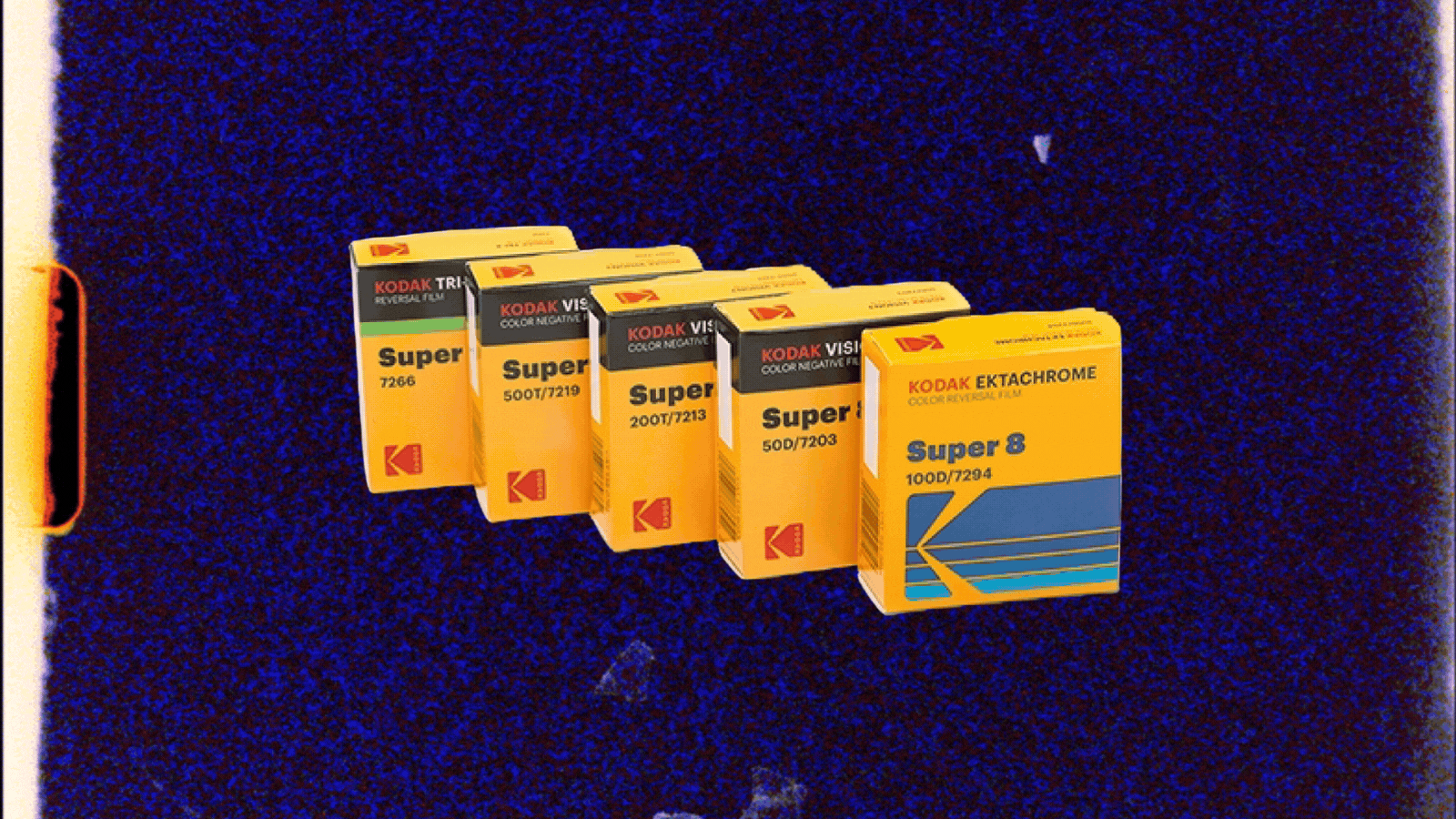
Analogue Movie Film 101 (Motion)
Storytelling, motion, and cinematic thinking
Analogue movie film asks you to think differently about motion. Instead of recording endlessly, you pl...
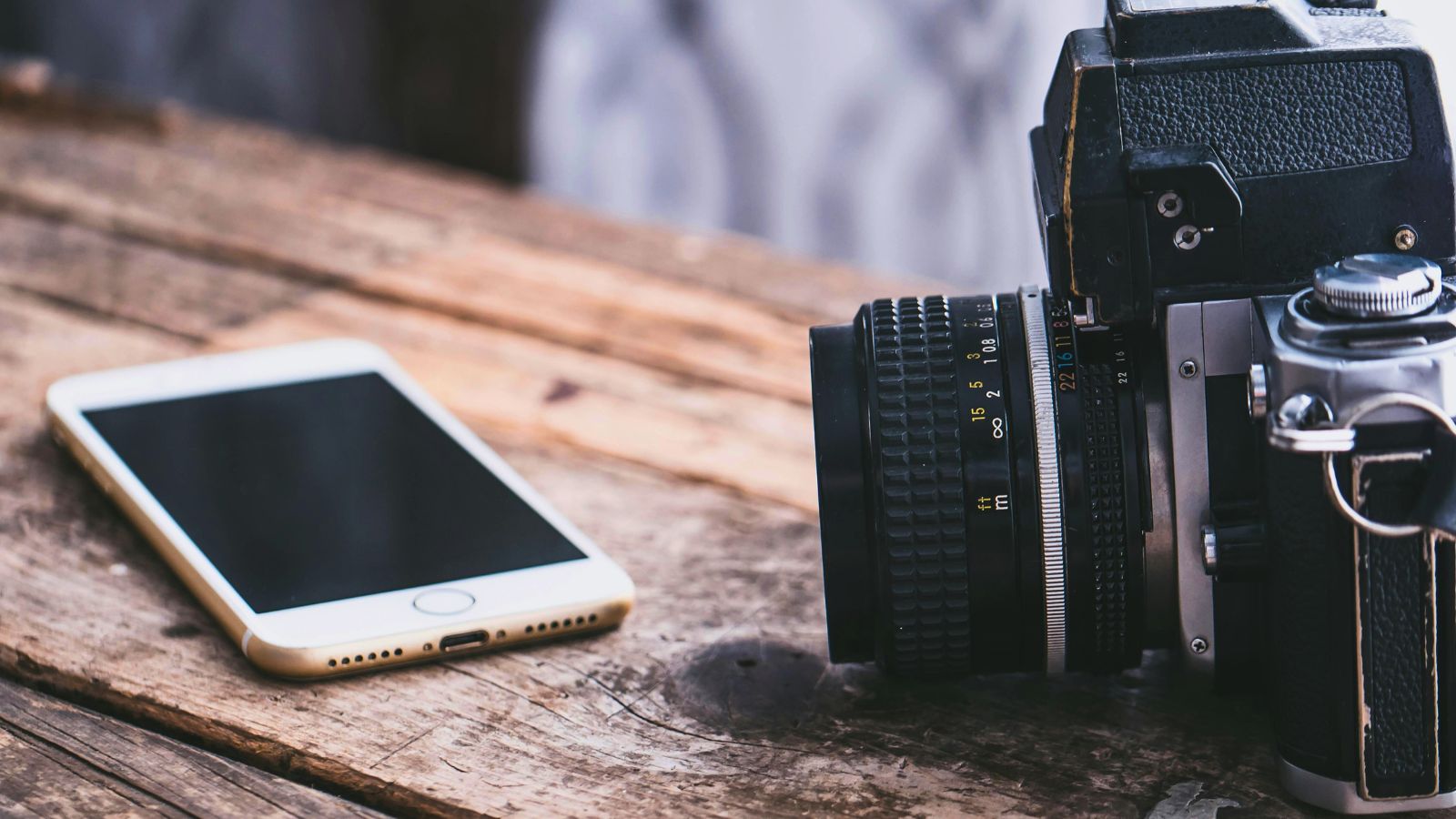
Film Camera vs Phone (Digital) Camera: Which Should You Choose
Film vs phone vs digital: which do you choose? Discover why more and more people are turning to analogue photography and screen-free activities over capturing memories on smartphones or professional digital cameras, why replicating film on digital software just isn't the same, and the community's shooting habits.
Subscribe to our newsletter 💌
Sign up for our newsletter to stay up to date on film photography news, sales and events:
Free Tracked Shipping
On all UK orders over £50
Passion For Film
An unbeatable range and an on-site lab
Our Customers Trust Us
Thousands of independent 5* reviews
All Deliveries are Carbon Neutral
Independently audited and verified by Planet
- Opens in a new window.




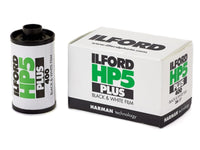
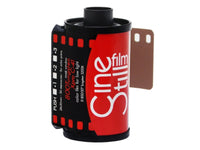

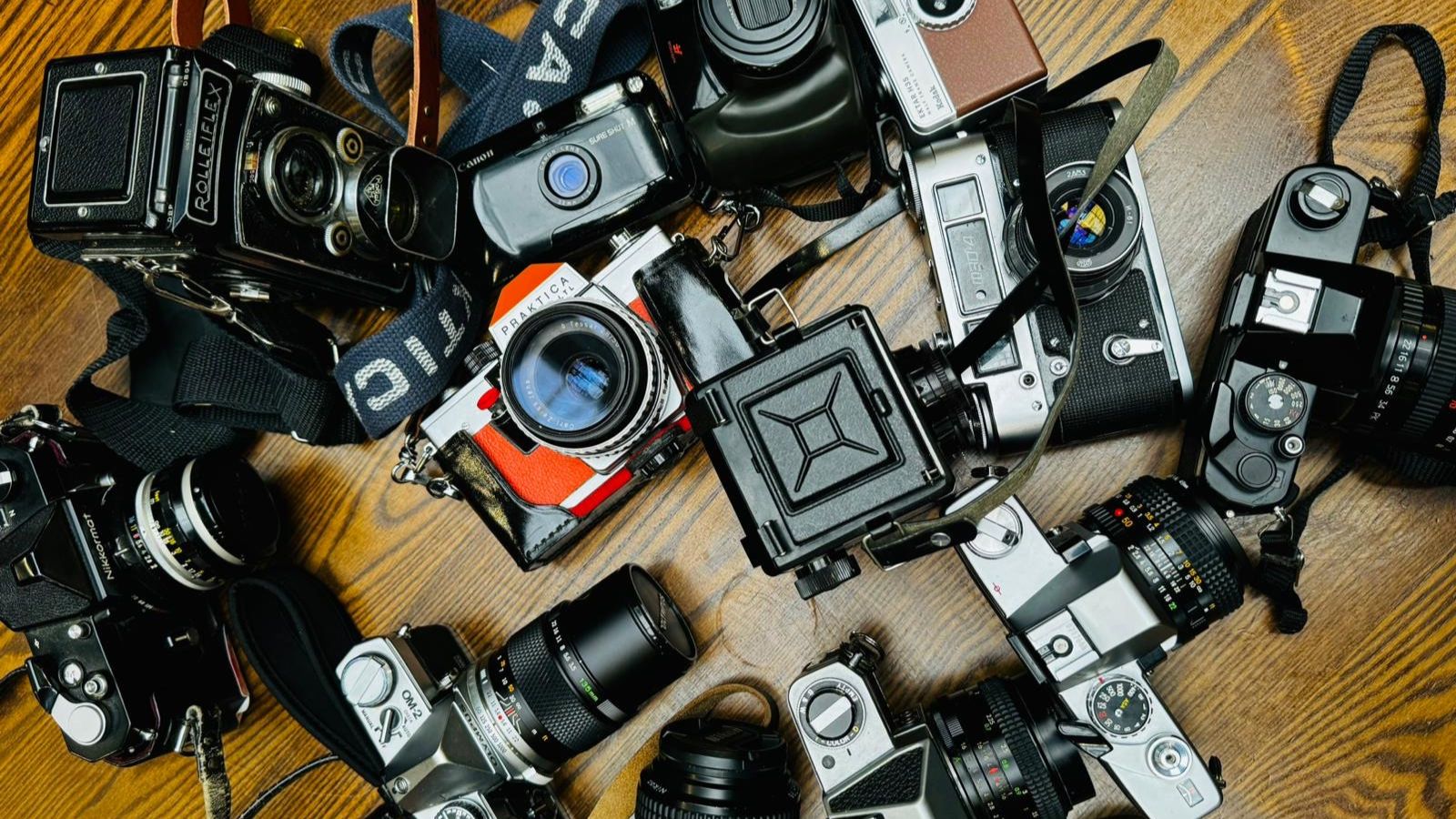
8 Comments -
Chris Dommett • -
Dr Nigel John Fairweather • -
steve sayer • -
Richard • -
Don •
1 2 →
Answering Lawrence Lee Huber:
When I bought my OM-40 I was told by the Olympus dealer that a Digital back would be available as a swap out for my existing camera. I believe for most people that it is not about the film as much as you might think. I love my mechanical cameras, ranging from 1932 -1988. Currently loaded are OM-4Ti, OM-3, Pen-FT, Nikon FE, Olympus 707, and XA., Leica III. The others are waiting their turn. I am ready to bulk load and I have all the chemicals for B/W at hand from a couple of years ago. I will enjoy the improvements I can manage in scan and post prod after. All relevant in the 21st Century. Are we not blessed with technology?
When I retired as a GP I took up Wedding Photography. I used Kodak Portra 35mm & 120 film a lot, also the Fuji equivalents. Now as an amateur I mainly use a Minolta RIVA 125 camera which some mistake for a digital camera, it is so compact. Many Auto features; you can over-ride them when necessary! I use mostly Kodak Gold 200 now, but your article has inspired me to try Portra again. For B&W I use Ilford films, & sometimes colour in hair etc. using photo inks on 6"x 8" lustre prints. I got some Ektachrome from Analogue Wonderland & plan to photo my A1 size Family Tree (back to 1506). Like microfilming!!
I photographed one wedding with some free Fuji 800 ASA film using only the light of 12 candles & a tripod. Bride & Groom requested this. Results were warm-toned & pleasing, but they had to stay still.
Through the 80s and 90s i used porta 400 vc as a wedding photographer, and the results from this stock was amazing skins tones were brilliant , and i loved this film .Im now retired and sold my blads (big mistake) but kept my om1 and om2 and have started using film again .Its great to shooting real pictures again with film ,so many new films to try at the moment loving ektar 100 but will probably go back to portra . (if price come down) what was once a wedding photographer go to film nicer than fuji, it is now a rich mans film
come on kodak you have lots of loyal followers bring this wonderful film back to affordable price
No Ektachrome, no Pan-f, what’s happened guys! Tried many others but always come back to these. And, yes I scan but no photoshop here, I don’t even crop, that’s what the viewfinder is for :-) Even back in the day we shot on film then telecined to keep that look. Check how many top movies are shot on film!
Was looking to see Portra 160 included. Film is fine. If you have film cameras that have not been abused and in good working order, I use film as a guide for tonality, style, textural qualities. Film still has a beautiful way of rendering highlights. True, once scanned it is a digital file, but a scanned film frame offers up a guide to follow. If one is not a professional, it makes perfect sense to embrace film. There’s no deadline!